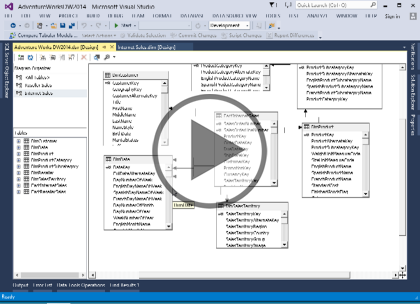Watch trailer
Course at a glance
Included in these subscriptions:
- Dev & IT Pro Video
- Dev & IT Pro Power Pack
| Release date | 10/10/2015 | |
| Level | Intermediate | |
| Runtime | 1h 8m | |
| Closed captioning | Included | |
| Transcript | Included | |
| eBooks / courseware | Included | |
| Hands-on labs | Included | |
| Sample code | Included | |
| Exams | Included |
Course description
In this course, you will learn how to use Microsoft SQL Server 2014 Analysis Services (SSAS). This course includes concepts, procedures and practices based on real-world experience giving both the novice and experienced SQL Server developer information on Advanced dimensions, Many-to-Many relationships, Performance and Security.
Prerequisites
This course does not require any prior experience with Analysis Server. It is assumed that students have working experience with SQL Server; basic relational database concepts (e.g., tables, queries, and indexing); data transformation services.
Learning Paths
This course will help you prepare for the following certification and exam:
MCSE: Business Intelligence
70-466: Implementing Data Models and Reports with Microsoft SQL Server
This course is part of the following LearnNowOnline SuccessPaths™:
SQL Server Analysis Services
Meet the expert
Using Microsoft SQL Server started for Thomas with a Laboratory Information System in version 6.5. The Analysis Service (also called SSAS) option in version 7 got him excited about Data Warehousing, but before he used a production version of SSAS, he became a Database Administrator for versions 6.5 through 2005 while working at a paper mill and home health agency. After writing reports as an application developer for 10 years, he rediscovered Online Analytical Processing (OLAP) implemented into Data Warehouses. Since 2009, he has become a speaker in the SQL Server community and a voice for Microsoft Business Intelligence (MSBI) for enterprises. His transition from Sr. DBA to a Business Intelligence Architect has been a great career path. Thomas has certifications MCP, MCDBA and MCITP in Database Administration and Business Intelligence.
Course outline
Dimensions and Relationships
Advanced Dimension (25:51)
- Introduction (00:56)
- Advanced Dimensions (00:46)
- Degenerate Dimension (00:44)
- Create Degenerate Dimension (01:14)
- Demo: Degenerate Dimension (05:28)
- Parent-Child Dimension (01:52)
- Demo: Parent-Child Dimension (05:59)
- Role Playing Dimension (01:41)
- Demo: Role Playing Dimension (04:49)
- Referenced Dimension (01:49)
- Summary (00:30)
Many to Many (23:07)
- Introduction (00:42)
- Many to Many Relationship (01:14)
- Many To Many - Bridge Data (01:16)
- Many to Many - New Dimension (00:31)
- Many to Many - Measure Group (00:25)
- Many to Many - Dimension Usage (00:33)
- Demo: Many to Many (05:53)
- Demo: Many to Many in Excel (01:32)
- Advanced Calculations (01:38)
- Ratio to Parent (00:28)
- Ratio to Root (00:27)
- Scope (00:33)
- Demo: Advanced Calculations (07:25)
- Summary (00:23)
Performance (15:35)
- Introduction (00:47)
- Cube Performance (01:19)
- Aggregations (01:56)
- Usage Optimizer (00:39)
- Demo: Aggregations (04:27)
- Partitions (00:58)
- Partition Storage (01:07)
- Demo: Partitions (03:42)
- Summary (00:34)
Security (04:21)
- Introduction (00:40)
- Security (01:50)
- Dimension Data (01:11)
- Summary (00:39)



